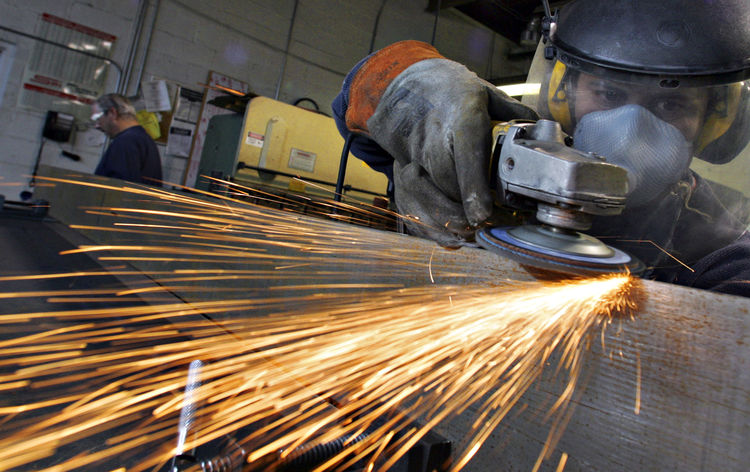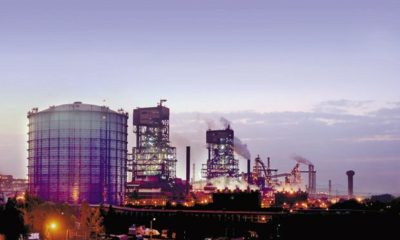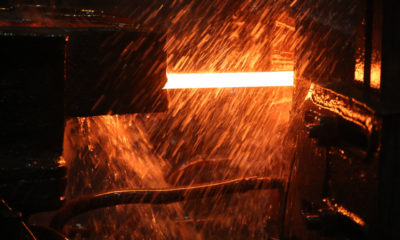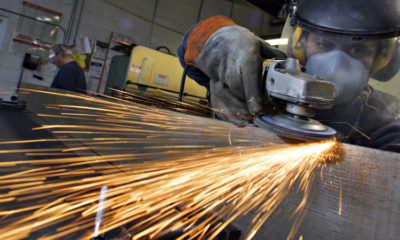- Stakeholders Worry as steel Import Rises
The Federal Government and stakeholders in the manufacturing sector have expressed worries over the low production level of steel and the huge amount spent on steel imports annually.
Annual steel production in Nigeria is put at under two million metric tonnes per annum, (about 0.11 per cent of global steel) while import is five million tonnes.
According to a Former Minister of State for Mines and Steel Development, Abubakar Bwari, Nigeria spends up to $4.5bn on steel imports yearly.
Also, local Annual Per Capita consumption is less than 10 kilogrammes compared to the world average Annual Per Capita consumption which stood at 208kg as at 2016.
Worried about this development, the Federal Government is making moves to boost local consumption of steel.
The Assistant Director (Steel) in the Ministry of Mines and Steel Development, Mr Ime Ekrikpo, gave this indication in Lagos during the Annual General Meeting of the Basic Metal Sectoral Group of the Manufacturers Association of Nigeria.
While presenting a paper on the theme of the AGM which was, Revival of Ajaokuta Steel Complex and Aluminum Smelter Company of Nigeria-Priority for Developing the Metals Industry in Nigeria, Ekrikpo said the government was concerned about the low per capita steel consumption in Nigeria and had the intention of increasing the consumption to 100kg by 2020.
He said, “The steel and aluminium sector substantially needs to be grown in the area of internal production and consumption to support and stimulate growth in virtually all sectors of the economy due to its importance in the industrialisation drive of the government.”
Ekrikpo added that the government had intention of exploring and exploiting the potential of the solid minerals sector and adding value to them.
“At the moment, the private sector is running the steel sector in Nigeria 99.9 per cent with the major metals recycling companies numbering about 95. Only about 35 or less of them are still active but operating at very low capacities (less than 20 per cent) producing less than 200,000 tonnes per annum,” he stated.
He attributed the low production capacity of the steel sector in Nigeria to the high cost of production which made the sector uncompetitive among other global players.
According to him, major steel rolling mills at Ajaokuta and Katsina have been privatised with only Katsina (Dana Steel Mills) being operational with upgraded facilities.
Jos was also privatised but is currently not operational, while Delta Steel Rolling Mill is partially operational, he said, adding that Ajaokuta steel mill was in arbitration.
The outgoing Chairman, Basic Metal, Iron and Steel and Fabricated Metal sectoral group of MAN, Chief Oluyinka Kufile, in his welcome address, observed that several product lines from the steel industry such as; iron rods, wire rod, steel coils, metal doors and others, as well as the products to produce them efficiently were inadequate due to insufficient raw materials and absence of policy environment to support the industry.
He acknowledged the efforts of government in creating enabling environment for industrial growth and also banning exports of scrap metals, a major raw material for the steel industry.
The new Chairman of the group, who was elected during the AGM, Kamarudeen Yusuf, urged the government to check importation of finished product manufactured from steel, saying that this was the only way local manufacturers could be competitive.
He said the government should also encourage underwriting insurance companies to come into the country and assist investors in getting their projects underwritten.
He disclosed that his firm, KAM industries, was set to inaugurate a 300-tonne capacity steel rolling mill (an equivalent of Ajaokuta steel rolling mill) before year end.

 Naira3 weeks ago
Naira3 weeks ago
 News4 weeks ago
News4 weeks ago
 Naira4 weeks ago
Naira4 weeks ago
 Jobs3 weeks ago
Jobs3 weeks ago
 Naira3 weeks ago
Naira3 weeks ago
 Travel3 weeks ago
Travel3 weeks ago
 Naira3 weeks ago
Naira3 weeks ago
 Investment4 weeks ago
Investment4 weeks ago
























